books and cleverness
I read books of all sorts, but mostly kids' lit and young adult literature and speculative fiction for all ages—usually from a feminist perspective.
I've adopted a personalized version of the CHOICE reviews approach to recommendations/star ratings:
***** = Essential, a.k.a. truly love, absolute must-read, buy it now
**** = Highly Recommended, a.k.a. this is a really good book; I would buy it as a gift
*** = Recommended, a.k.a. pretty good; worth reading
** = Optional, a.k.a. meh
* = Not Recommended; a.k.a. this is not a good book
In the Shadow of Blackbirds
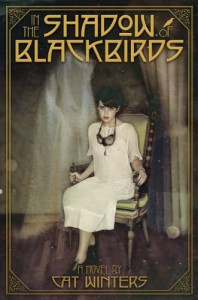
Overall Recommendation: Optional. This book’s strengths lie in its fictionalization of historical detail, rather than its plot.
I also recommend reading this with the awareness that it is a ghost story. I did not; I kept expecting it to turn out to be simply a psychic-connection story, and therefore I suspect I missed out on some of the potential enjoyment of spookiness.
What is there to like?
▪ The historical subject matter—the confluence of World War I, the flu pandemic of 1918, and the revival of Spiritualism and spirit photography—should spark readers’ interest and prompt a desire to learn more about what really happened, which is one of the strengths of reading historical fiction. Cat Winters has incorporated some interesting components from real-life events, like folk remedies and preventive measures that were common during the epidemic, and a character whose methods suggest that he is based on Harry Price, a psychic researcher who made a business of exposing spiritualist frauds. Credit to the author here: I began looking these things up as a result of reading this.
▪ A female protagonist, Mary Shelley Black, interested in science and technology, independent, and determined to find out the truth.
▪ The book’s design, including chapter headings and decorational art. The inclusion of historical photos and visual materials to lend weight and a sense of realism and immediacy to the historical context, is an especially good choice. Here’s one that is used, for example, of the Red Cross response during the flu epidemic.

▪ A major theme is the destruction of war, and the price paid for it in the lives of a nation’s youth. The narrator has a number of occasions to reflect on this—her father is arrested for his pacifist beliefs, she loses the boy she loves when he joins the army, and she encounters wounded soldiers when she volunteers at a Red Cross station.
What’s not to like?
▪ The love interest, Stephen Embers, is more of a symbol of the young man destroyed by the circumstances of the war than a fully dimensional character—he is already gone at the point the novel begins. As such, it is difficult to become invested in Mary Shelley’s feelings for him, and the sense of urgency she has in discovering what happens to him (plot problem #1).
▪ The thing about mysteries is, you already know the crime that has been committed, so the driving force is finding out who did it. In this case, we always already know who did it, and we always already know the end result. So, Mary Shelley’s investigations are only into the circumstances surrounding what we already know to have happened. This is the other reason why the plot is less than compelling.
There were also a few points about the book that I found off-putting:
▪ There is a weird ghost dry-humping scene. Not sex, because he’s a ghost and that means he can’t take off his ghosty clothes because that’s how ghosts work? But then how he is corporeal enough to make out and have an erection? I don’t know, it doesn’t make a whole lot of sense.
▪ The aunt is under 30 and has a fascination with a character who is a few years her junior, but she’s drawn as if she’s some out-of-touch middle-aged woman chasing after a much-younger man.
▪ The protagonist repeatedly excuses unsolicited attention and flirting from soldiers as, basically, the least she can do for our brave men in uniform.
What made me pick it up?
Picked it from my to-read list, thinking spooky and historical sounded good.
Similar To:
All Men of Genius, Lev A. C. Rosen—for another forward-thinking, technically-minded heroine with a mystery to solve
The Fairy Ring: Or Elsie and Frances Fool the World, Mary Losure—this is one that I’m actually looking forward to reading myself, and the two girls and their photographs are specifically mentioned in this book. Pretty cool!
Rilla of Ingleside, L.M. Montgomery—for a WWI novel written by a contemporary (pretty sad stuff, and romantic too, of course)
The Diviners, Libba Bray—for some supernatural teenagers stuff, post-WWI
"In the stories we seem to remember most, we’re given a certain set of ingredients to start us off, and then we’re let loose to build on them and let them affect us and use what we know and what we’ve felt, and we tie the whole experience together into one thing, without a separation between what the story gave us and what we ourselves brought to it."

Illustrator and author Jon Klassen's acceptance speech at the Boston Globe-Horn Book awards talks about the evocative power of picture books, to allow the reader to construct long-lasting memories that draw as much, or more, from what exists beyond the page as on it. It's well worth a read.
Harry Potter and the Philosopher's Stone
Hermione's books and cleverness are more important for saving the wizarding world than anything Ron and Harry do. Hermione always seems like she's too focused on studying to be fun, but she could have won the Tri-Wizard Tournament without breaking a sweat, even underage. Own it, Hermione!
Grave Mercy (His Fair Assassin Trilogy #1)

Overall Recommendation: I actually don’t recommend this book because I object so strongly to the points that I did not like (see below), but neither is it a one-star book.
What is there to like?
▪ The premise, a convent of lady assassins, is pretty cool.
▪ In this alternate-historical world, national identity is tied very closely to religion, old gods are appropriated by the state religion as “saints,” and believers in the old ways are thought of as heretics. Although I believe the particular gods/saints in this story are imaginary, the overall picture of politics and Catholicism in Europe, as well as folk religion in Brittany specifically, in the Early Modern (?) period is a nice tie-in for readers interested in history—or who might become so after reading this.
▪ Several discussions about the roles available to women at the time—mother, mistress, wife—and the limitations of power, both social and political.
▪ The plot is action-y and intrigue-y.
What's not to like?
▪ I first started disliking reading this book when language problems started cropping up. Although I’m aware that a) a YA novel written entirely in Early Modern English would attract few, if any, readers, and b) the characters would probably actually be speaking French anyway, the author has clearly gone to some trouble to attempt writing both dialogue and narration (as it is in first-person) in a more period-appropriate-sounding voice. Therefore, it becomes increasingly noticeable and grating when characters use anachronistic language such as plus, neutralize, quit in the imperative (as in “Quit intimidating my novice…”), and fine meaning “ordinary.”
▪ Although the depiction of girls being married off as young as 13 is historically accurate, both Ismae (at the beginning) and the duchess are far too self-possessed to be believable as 13-year-olds, and I’m afraid the impact of the marriage plights of both characters is actually lessened by the fact that they seem so much older.
▪ Hints are not so much dropped as forcibly shoved off high-rise balconies to land with resounding thuds. None of the turning points are truly surprising.
▪ The concept of a convent of lady assassins may be cool, but I had serious objections to the way it was pounded in that in order to be an effective female assassin, the novitiates had to use sex appeal or indeed actual sex, and that men are essentially all easily-duped sex-crazed (heterosexual) fools. I feel this fits with the boom within the past decade or so in the encouragement of young women to use their sexuality as a means to get what they want from men, thus participating in their own objectification rather than demanding to be treated as equals.
▪ . . . which brings us to the final, most seriously problematic point of all. I’ll label it as a spoiler, but I don’t want to hide it because I feel so strongly about it. So: spoiler alert for the rest of this paragraph. Since Ismae was raised to believe in the precepts of her convent, she struggles with her growing feelings for her love interest—so far, so normal for YA romance. But her actual decision to have sex with her love interest is motivated not by her own desire, but because having sex with him will save his life. Are. You. Kidding me. Like, seriously. Is this real. Sure, there’s attraction between the characters. Sure, she is the one who makes the decision. But Ismae has many opportunities to act for her own desires of her own will, and she never does so until the point at which she realizes that her magical poison-immunity powers can somehow be transferred to her lover by having sex with him and thus save him from death. Her final decision is all about him, not her. Which, given the whole context of the otherwise basically feminist book, is infuriating. I would have thrown the book across the room in disgust, but it was a library copy and also I was on a plane.
Similar To:
Throne of Glass (Throne of Glass, #1), Sarah J. Maas—lady assassin gets picked up by a dashing courtier for a mission of court politics, romance ensues
Shadow and Bone (The Grisha, #1), Leigh Bardugo—former lower-class magical warrior-type gets picked up by the court powers; also there is a heroine-gets-fitted-for-a-pretty-dress-and-is-transformed scene—are these mandatory in YA these days?
Seraphina (Seraphina, #1), Rachel Hartman—royal bastard love interest, plotline of a princess being manipulated for political gain
What made me pick it up?
I read a positive review of the second book in the series (Dark Triumph), which is new this season, and was interested enough that I wanted to read this first one.
The Alchemist (audiobook)

What is there to like?
♦ "Read by Jeremy Irons." This actually is the reason I listened to it, so: mission accomplished!
♦ The primary message, that you should seek out what is most important for you to do with your life, and do whatever you can to accomplish it or else you will probably spend your life dissatisfied and/or regretful, is something that makes perfect sense to me (but see below).
What is there not to like?
♦ That primary message, although I agree with it, seems like it is such common sense that it doesn't need to be stated? It's not a compelling or surprising message, so I can't really think of this as a compelling or surprising work of literature.
♦ Additionally, I have a hard time understanding why it would be convincing or helpful for people to be told that pursuing their life's purpose is predetermined by the universe, and that they have an obligation to the universe to pursue it. That seems like the opposite of empowering.
Overall Recommendation: Optional (="meh")
Me, Him, Them, and It

What is there to like?
▪ I can’t speak from experience, but it seems to me that this book captures the mental turmoil of what a pregnant teenager would be going through. Evie constantly doubts her ability to go through with any of the options available to her, which paralyzes her and keeps her from making a decision about any of them (to the frustration of those around her), which seemed really genuine. I would say that I can’t imagine what that must be like for girls who are really going through this, but Carter clearly can, and has done a fine job of portraying it so that readers can as well.
▪ The way the chapter headings show what Evie’s state of mind is as the story progresses; likewise, Evie’s names/pronouns for other people as a key to how she feels about them.
▪ Positive portrayal of "alternative" families. The best parents in the book are an interracial, lesbian couple who have adopted.
What's not to like?
At its heart, this book is a poor-little-rich-girl story, in that Evie becomes pregnant as a result of deliberately acting out for the sake of attention from her well-off but emotionally distant parents, (she’d fit in well in The Breakfast Club, I kept thinking), and that is the driving force for a resolution. I’m not saying that Evie’s privileged socioeconomic position invalidates the story, or that teen pregnancy isn’t always a big deal no matter who it involves. But some readers may not be able to be sympathetic to Evie’s plight, given that she, unlike many teen mothers, has all options available to her, given her family’s resources, and that she, unlike many teen mothers, has a strong, supportive network of friends and family to give her good advice and to take care of her while she makes her decisions and throughout the duration of her pregnancy.
What made me pick it up?
Tryin’ to read YA books about real issues, important ones. (Haven't read enough yet to know about any "Similar To" books, sorry.)
Overall Recommendation: Recommended.
The Brides of Rollrock Island
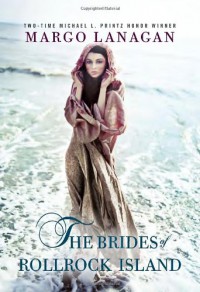
What is there to like?
A lot!
▪ First, the language blends and balances lyricism and colloquialism in its dialogue and first-person narration beautifully.
▪ I love that the story shifts in perspective as a means to show the progression of what happens on Rollrock through the generations: the before-, the as-, and the after-it-happens. It’s a skillful, yet genuine way of accomplishing the next point that is so well done, namely…
▪ …the way that the reader is slowly able to piece together what happens, based on the way the characters speak to each other in keeping with what is and isn’t given knowledge from their point of view—which changes over generations (which is fascinating but also makes so much sense!). I loved, for example, the way the dialogue allows the reader to figure out why there are no girl children on Rollrock, in just a tiny exchange between the Rollrock boys. The mystery is slowly and naturally revealed, such that both the suspension of the mystery and the gradual understanding are a pleasure for the reader.
▪ Occupying the border between magical realism and outright fantasy, this book, like Tender Morsels, uses fantastic elements to tell a story that is deeply involved in some of the darker issues of women’s lives, places in society, and treatment by men. Though I confess that I was able to enjoy The Brides of Rollrock Island more than the often-devastating Tender Morsels, Brides is still troubling, challenging, and rewarding.
What's not to like?
▪ The cover photo and jacket copy! Seriously, this is problematic—I would never in a million years have picked up this book in the store or library based on the cover, and if that were how I decided to read most of my books these days (sometimes it still is!) I would have missed out. I’m actually really mad at Knopf’s marketing team for not doing their job of helping Lanagan connect to her readers.
▪ This is really just nitpicking, but there is a bit of highly-unbelievable logistics going on in the second Daniel Mallett chapter. But this is a really minor flaw. I'm only mentioning it to maintain some critical credibility, honestly.
Similar To:
It’s not really all that similar to Lanagan’s previous book, Tender Morsels, but I would certainly recommend it to anyone who finds him- or herself intrigued by Lanagan’s style and the themes in Brides.
Likewise, I would recommend Pretty Monsters, by Kelly Link, for people interested in stories about women with a hint of slightly unsettling fantasy.
What made me pick it up?
It got five starred reviews, according to Elizabeth Bluemle’s roundup of 2012 Starred-Review Children’s and YA Books, which I am steadily working through! Also I had it on my to-read list anyway.
Overall Recommendation: Highly recommended.
The Daughter of Time (Inspector Alan Grant Series #5)

Revisionist history presented as a sort of cross between a Socratic dialogue and Rear Window, this is an easy read for those who aren't great at reading nonfiction (I include myself in that group). I'm totally willing to buy into the portrait of Richard III presented here, but since it's technically fiction, one must be skeptical. An edition that included an afterword with notes on sources and what fictional liberties were taken would be welcome.
What made me pick it up?
A co-worker recommended and loaned it to me, after the Richard III discovery.
Liar and Spy
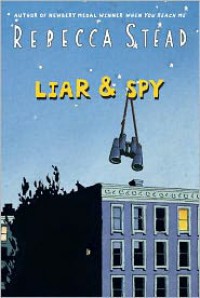 This seems like a book that adults would think is really great but that kids might not be excited about. Like when "literary fiction" is deemed excellent by critics but on-the-street-readers might not be very interested in it.
This seems like a book that adults would think is really great but that kids might not be excited about. Like when "literary fiction" is deemed excellent by critics but on-the-street-readers might not be very interested in it.
A Confusion of Princes

Not Garth Nix's best work. The first 5 chapters or so were actually pretty tough slogging--so much exposition, and in a voice that sounds like a 19-year-old boy's efforts at science fiction. I don't know if that last bit is a compliment: Nix is obviously capable of writing in other tones, so maybe it's verisimilitude. But it's also not particularly enjoyable writing. Furthermore, there is quite a bit of repetition throughout the book, from Khemri speaking from his present-tense, much-wiser narrating voice rather tiresomely pointing out the arrogance of his former ways and how he's learned so much since then.
Similar To:
Ender's Game, Orson Scott Card
Feed, M.T. Anderson
Not Similar To:
Mister Monday (and the rest of the Keys to the Kingdom series), Garth Nix (which I love)
Sabriel, Lirael, Abhorsen, Garth Nix (which are also pretty great)
What I'm saying is, Garth Nix has some good stuff; this book isn't it, though.
P.S. Not the best copyediting work on display here.
The Fault in Our Stars

I mean, obviously this is a really well-written book with lots of cleverness and poignant moments and it made me tear up at a few points and it's so good that this kind of book can be written about youth and mortality.But, like, it's also a Teenagers With Terminal Illnesses In Big True Love With Capital B-T-L story? And those are kind of the worst?
This book is actually so very good at capturing the rhythm and realities of contemporary speech that it almost seems ephemeral. I wonder if in 5 years or so it will still hold up and seem worthy of the accolades it's received, or if it will have passed into unrelatable-ness. Let's all meet back here in 5 years and discuss, OK?
Out of the Easy
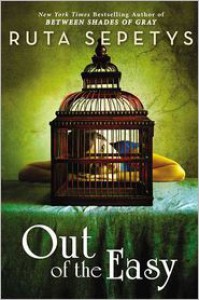
What is there to like?
▪ Though the tough-old-broad madam character is a bit of a cliché, Willie is a likable representative of the type.
▪ Josie's friend Patrick's secret is played at the right level, in terms of how largely it figures in the story and fitting into the sensibilities of the time period.
▪ Strong sense of New Orleans throughout.
▪ A (rather unexpected) theme of the difficulty young people have in the role of primary caregiver for aging parents/grandparents.
▪ Josie's an independent, strong-willed young lady with admirable academic aspirations.
▪ The ending has more than a touch of the fairy godmother, but what Josie ends up doing to reach her goals is more believable than not.
What's not to like?
▪ The plot is quite predictable in a Hollywood-movie kind of way, right down to the will-she-go-through-with-it scene that's inevitable for a story about a girl who works for a brothel but isn't one of the working girls, and the "fight with the boyfriend because he doesn't know about her problems and he thinks she doesn't appreciate him" scene.
▪ Conveniently perfect boyfriend.
What made me pick it up?
It was on my to-read list because of a starred review in PW, and I requested it from the library when I got a notification that it was out.
Overall recommendation: Recommended
The Apothecary

What is there to like?
▪ The first few chapters, devoted to Janie’s move to London and feeling out of place, are nicely done.
▪ Also in the first few chapters, attention is drawn to conditions in post-war Britain, which is important in its own right but also helps readers understand the protagonists' strong motivations for finding a way to stop the destructive power of nuclear bombs.
▪ Janie’s parents are drawn as caring and funny, and Janie has a good relationship with them, which is a strength in children’s literature, which can sometimes lean pretty heavily on the orphan trope, or else portrays parents as bumbling or distant.
What's not to like?
▪ This is a book that is trying to have it both ways—“it” being whether it is a story about magic or science. Ordinarily the distinction probably wouldn’t be worth noting, but the characters so strenuously object to the very idea that they are performing magic, saying NO, IT’S SCIENCE! and then offering quasi-pseudo-scientific explanations, that it draws attention to itself. And readers may be willing to play along with the idea to some extent, but most will reach a point at which this becomes silly—such as when a “Dark Force” is called forth, or when “the Quintessence” is released.
▪ Definite racial insensitivities. Jin Lo, the Chinese apothecary, does “a kung fu kick” and—I’m not even kidding—is described as “inscrutable.” Later, Janie and Benjamin are afloat in the Arctic Sea and are Rescued By The Natives!
▪ Using Russians and Germans as straight-up baddies in a book written in 2011 feels a shade off-kilter and lazy. While that might be expected in a book actually written in 1952 and therefore acceptable as a product of its time, this portrayal doesn’t need to be perpetuated further. And historical fiction that presents a more nuanced vision of “the other” in war is being written these days, and well—see Code Name Verity for an excellent example of WWII fiction (though, admittedly, for an older audience).
What made me pick it up?
Good cover design; I liked the title.
Overall Recommendation: Optional (Two stars is not a bad book; it's a "meh" book. This is a "meh" book.)
Timmy Failure: Mistakes Were Made
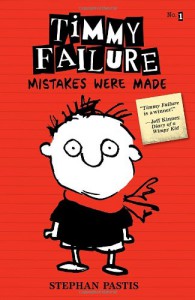
What is there to like?
▪ This book genuinely made me laugh. Not like “oh, yes indeed I suppose that was rawther funny, hrm hrm” but actual laughs. I think this comes from Pastis’s professionalism as a cartoonist—his artwork is spare, but effective, and the artwork is the punchline to the funniest jokes, rather than simply illustrating it after the fact. (The chapter in which the mom’s boyfriend is introduced is hilarious.)
▪ Timmy’s voice is also genuinely funny! It’s an extremely fine line between making an oblivious-yet-self-assured narrator sound funny and making him just sound like an overly sarcastic know-it-all, and Pastis never puts a toe on the wrong side of that line.
▪ Timmy often resembles an un-self-aware Calvin (of “and Hobbes”), in terms of his precociousness (in some things), his overdeveloped vocabulary, his preference for his own imagination over the company of friends his age, and his furry companion. But this book breaks with tradition for Timmy’s relationship with his teacher. That’s not to say that Timmy’s run-ins with Old Man Crocus aren’t classic class troublemaker-vs.-teacher entertainment, but it’s really great that Pastis chose to include a teacher who understands how to help Timmy succeed in the end, rather than leaving it at that.
What's not to like?
▪ Please, kid-lit authors, stop using the “kids try to avoid getting into trouble by lying about a non-existent play” device. It’s super old and overused, and it probably wasn’t funny the first time someone used it.
Similar To:
Diary of a Wimpy Kid, Jeff Kinney and Dork Diaries, Rachel Renée Russell (I assume, not having read either.)
Calvin and Hobbes, Bill Watterson
What made me pick it up?
This book has been getting a huuuuuuuuuuge publicity push from Candlewick for months (I think there was a full month when 99% of their Twitter posts were Timmy Failure-related), and loath as I am to say that a marketing campaign worked on me personally, I was curious to see if the book lived up to the hype.Even so, I must say I didn’t expect to like this book more than just passing amusement. I was especially leery when I read this interview with Stephan Pastis, because the kind of character he describes as his inspiration for Timmy is the type of character I find physically uncomfortable to watch, rather than a source of entertainment. I’m glad that Timmy both fails to live up to and exceeds my expectations in that sense.
Overall Recommendation: Recommended! 3.5 stars? I don't know; star ratings are hard. This book is pretty light entertainment, but it's good at being that.



 1
1
 1
1



